
[Henry Ford]
With every personnel change, a team goes through the five phases of group dynamics again and again, more or less intensively.
In order to solve the challenges more easily and efficiently, we offer counselling and training for the empathetic accompaniment of group processes.
Here, participants learn and try out how they can assess the team situation more easily with the help of non-violent communication and other proven methods in order to develop measures that successfully support the team in developing a high-performance way of working.
In our lives we are part of many different groups. Be it family, circle of friends, sports club, team colleagues, departments or even as part of a company.
All groups are subject to the same principles of group dynamics and go through these in different forms.
Especially for people involved in group leadership, it is therefore useful to recognise the dynamics in a group and offer helpful interventions to help a group reach a state of workability more easily.
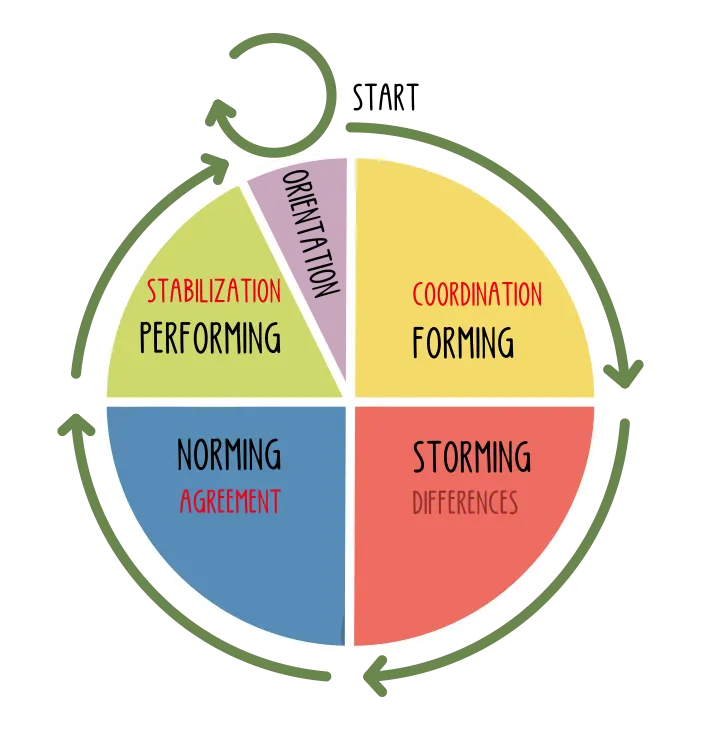
It is important to note that it is not possible to skip a phase. If certain phases are suppressed or ignored, they will come up again at another time. For this reason, it is advisable to accompany and promote the group dynamic phases in a targeted way.
With the help of Nonviolent Communication, the dynamics can be analysed on a feeling and need basis and helpful strategies can be found more easily.
Every group goes through at least 5 phases during its existence.
In the forming or founding phase, the group members get to know each other.
The storming or dispute phase is characterised by the struggle for one’s own place in the group.
During the norming or contracting phase, rules are negotiated on how the group members want to deal with each other.
In the performing or working phase, a group becomes capable of acting or working and can realise its common goals.
The orientation phase is characterised by reorientation and reflection. Some groups dissolve afterwards. Others re-enter the storming phase in a modified form to reintegrate the changes fr

In the forming or founding phase, some people come together to realise a common goal. This can be coming together in a sports club, for a workshop or training, it can be a composition of a team that is to work together over a longer period of time.
In this phase, people are usually still very reserved. There are often feelings of uncertainty, a certain excitement and also curiosity about what the new situation will bring.
People think about who the others are. How do we get to know each other? How do we relate to each other? The new group members crave information to help them find their way around the new situation more quickly.
It is therefore difficult for a new group if there is not enough information available. In addition, it is still very difficult to deal with conflicts in this phase.
Supportive interventions at this stage are to offer extensive information. It is helpful to facilitate getting to know each other and to show acceptance.
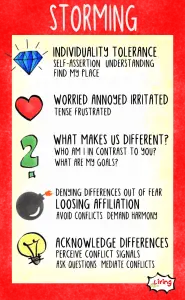
After getting to know each other, the group members try to bring their individuality into the group. This often leads to tensions. People need tolerance, understanding and appreciation. They want a place in the new group that is suitable for them.
In this phase, people often feel annoyed, worried, they are sometimes tense and irritable and occasionally frustrated.
Central questions are “What makes us different?” “What do I value?” “What do I stand up for?” and “Who am I in contrast to you?”
Difficulties during this time can arise when differences are denied because there is a fear of losing belonging. Pretended harmony and the suppression of upcoming conflicts can also lead to blockages.
In order to successfully accompany this often exhausting time, it is often helpful to acknowledge the existing differences. Conflict signals should be picked up and addressed. Moderation or mediation can help with escalating conflicts.
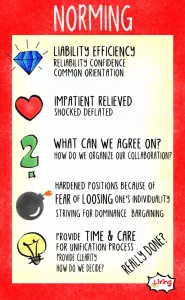
When the first group rules are found, there is often a sense of departure. Some people are relieved or disillusioned. Some are hopeful and are impatient that things can now go further.
People now need reliability and commitment.
They long for a common direction, confidence and incipient efficiency.
The priority now is questions like “How do we want to work together?” and “What can we agree on?”
This phase is hindered by hardening positions that can arise from fear of losing one’s own individuality. Members with a strong desire for dominance can slow down group development. Hasty solutions often lead to new problems, as does endless haggling over agreements.
Sufficient time and care in the agreement process can be helpful at this stage. Providing clarity and agreement on how future decisions will be made in the group can be effective support.
Last but not least, it is now useful to check whether this phase is now really over.
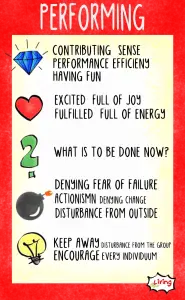
Now the group is ready to work.
The group members now experience meaning in what they are doing. They want to contribute, now experience efficiency and enjoy what they are doing.
They possibly feel enthusiastic, fulfilled, happy and full of energy.
The most important question now is “What to do now?”
New difficulties can arise from external disturbances. Blockades due to fear of failure hinder the ability to work just as much as frequent interruptions due to critical feedback. Excessive actionism without reflection and denial of upcoming changes can prove obstructive.
The most important support for a group that is able to work lies in encouraging the individual and protecting the group from outside disturbances.
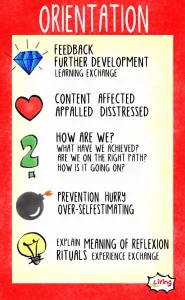
“If you want to stay the way you are, you have to keep changing.”
To be effective in the long run, regular reflection and adaptation is needed.
Groups need feedback, exchange and need to learn how to deal with change.
At this stage, group members are often shaken by the perceived loss of joyful contribution. They may also be hopeful and curious because of new insights.
Questions like “How are we doing?” “What have we achieved?” “Are we on the right track?” and “Where do we go from here?” drive group members.
Difficulties can arise if this time of reflection is avoided or done with too much haste.
You can support the group by explaining the meaning and importance of reflection. Encourage rituals and provide the space for regular sharing of experiences.
copyright agile-living ©2021
+49 179 5122527